
6 Smart Ways to Use Seasonal Buying to Cut Restaurant Costs in 2025
August 20, 2025
Quick Guide: Vetting Low-Cost Chicken Suppliers Without Risk
August 22, 2025As a business owner in the food industry, I’ve seen firsthand how the right distributor can make or break your operation. Did you know that a poor distribution choice can lead to supply chain disruptions, quality issues, and lost revenue? In fact, a recent survey found that nearly 70% of food businesses experienced supply chain disruptions due to distributor failures.
The US food distribution landscape is dominated by major players like Sysco, US Foods, and Performance Food Group. However, traditional comparison methods often overlook crucial factors beyond pricing and product selection. I’m here to guide you through the six hidden factors that can make all the difference in your business’s success.
Key Takeaways
- Understand the importance of choosing the right distributor for your business.
- Learn about the limitations of traditional comparison methods.
- Discover the six hidden factors to consider when selecting a distributor.
- Get insights from industry experts and real-world experiences.
- Make informed decisions when selecting a distribution partner.
The Critical Role of Wholesale Food Distributors in Your Business Success
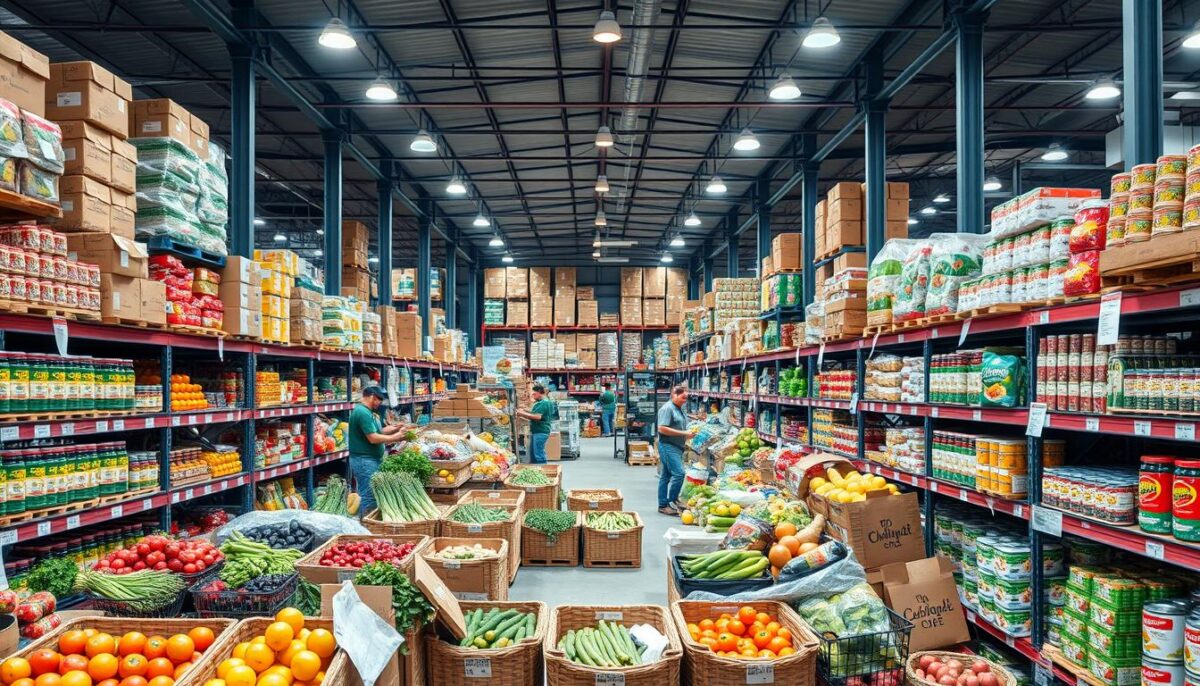
Wholesale food distributors are the backbone of the food industry, connecting manufacturers with businesses like restaurants, hotels, and retail stores. They ensure that businesses have the right inventory, delivered on time and at competitive prices.
The right distributor partnership can significantly impact a business’s ability to maintain consistent quality, manage costs, and meet customer expectations. By serving as a critical link between food manufacturers and businesses, wholesale food distributors add value beyond just delivering products.
Some of the key ways distributors add value include inventory management, menu planning assistance, and market insights. They help businesses navigate seasonal changes, market fluctuations, and supply chain challenges, making them strategic partners in business growth.
Understanding the full scope of a distributor’s role is essential before comparing options. By recognizing the importance of wholesale food distributors, businesses can make informed decisions that drive their success.
Beyond the Basics: Why Standard Comparison Methods Fall Short
The process of choosing a food distributor can be complex, and relying solely on standard comparison methods may not yield the best results. Many businesses focus primarily on price and product selection when evaluating distributors, but this limited approach can lead to overlooking critical factors that significantly impact long-term success.
When comparing food distributors, it’s essential to look beyond the surface level. Standard comparison methods often fall short because they fail to consider operational factors that affect day-to-day business operations. For instance, the quality of service, the range of products offered, and the distributor’s market presence are crucial elements that can make or break a business partnership.
To make an informed decision, businesses must dig deeper into a distributor’s capabilities. This involves assessing their distribution network, financial stability, and the quality of their proprietary brands. A comprehensive comparison should also consider the distributor’s expertise in serving specific industries and their ability to integrate technology into their services.
| Distributor | Product Range | Service Quality | Price Competitiveness |
|---|---|---|---|
| Sysco | Wide range of products | High | Competitive |
| US Foods | Extensive product selection | High | Very Competitive |
| Gordon Food Service | Diverse product offerings | Excellent | Competitive |
By considering these hidden factors, businesses can make more strategic decisions when choosing a food distributor. It’s not just about finding the lowest price or the widest product range; it’s about establishing a long-term partnership that supports business growth and success.
Hidden Factor #1: Distribution Network Depth vs. Marketing Claims
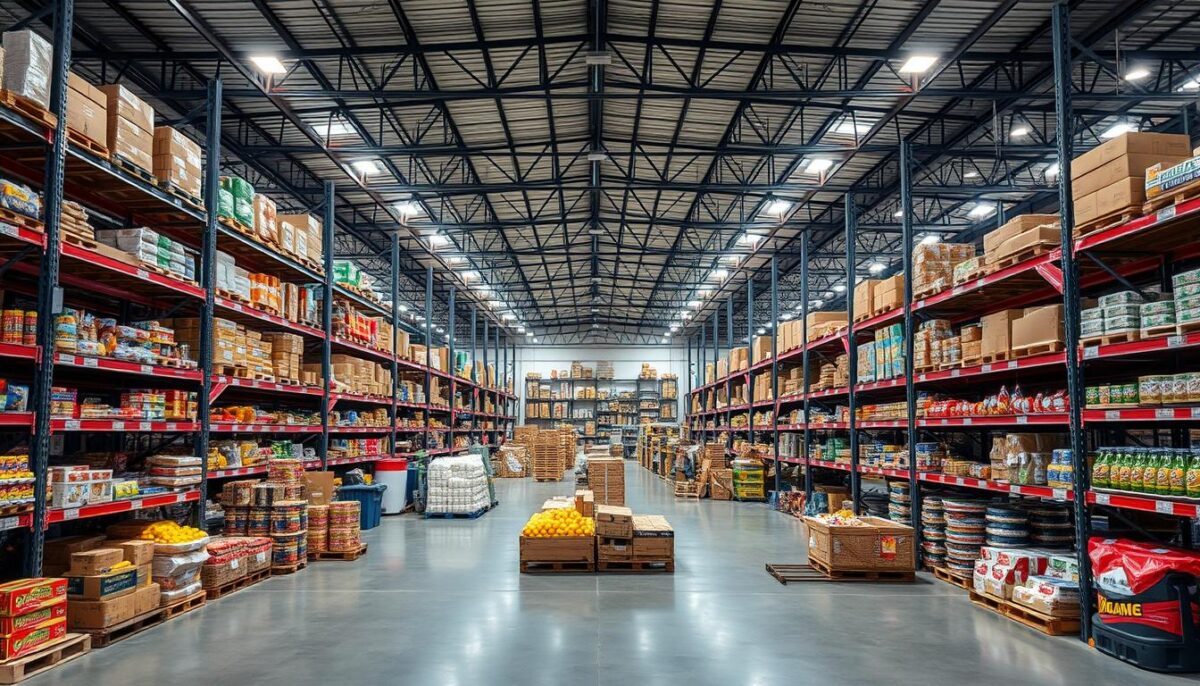
Behind the broad marketing claims of food distributors lies the reality of their distribution capabilities. It’s crucial to understand the depth of their network to ensure a reliable supply for your business.
Evaluating Real Coverage Areas of Major Distributors
Major distributors like Sysco and Performance Food Group (PFG) often boast about their extensive networks. Sysco operates over 330 distribution centers across North America, serving more than 700,000 customers. In contrast, PFG has over 150 distribution centers and serves around 300,000 customers. Understanding the real coverage area of these distributors is vital.
How Performance Food Group and Sysco Differ in Regional Strength
Performance Food Group and Sysco have different regional strengths. While Sysco has a broader national presence, PFG excels in specific regions. Evaluating their distribution networks reveals that Sysco’s extensive facilities enhance their delivery times and product freshness. In contrast, PFG’s focused approach allows for stronger relationships in their key areas.
To make an informed decision, it’s essential to assess a distributor’s claims by asking about delivery schedules, minimum orders, and emergency delivery capabilities. Verifying their actual capabilities in your location is crucial before committing to a partnership.
Hidden Factor #2: Financial Stability and Credit Terms
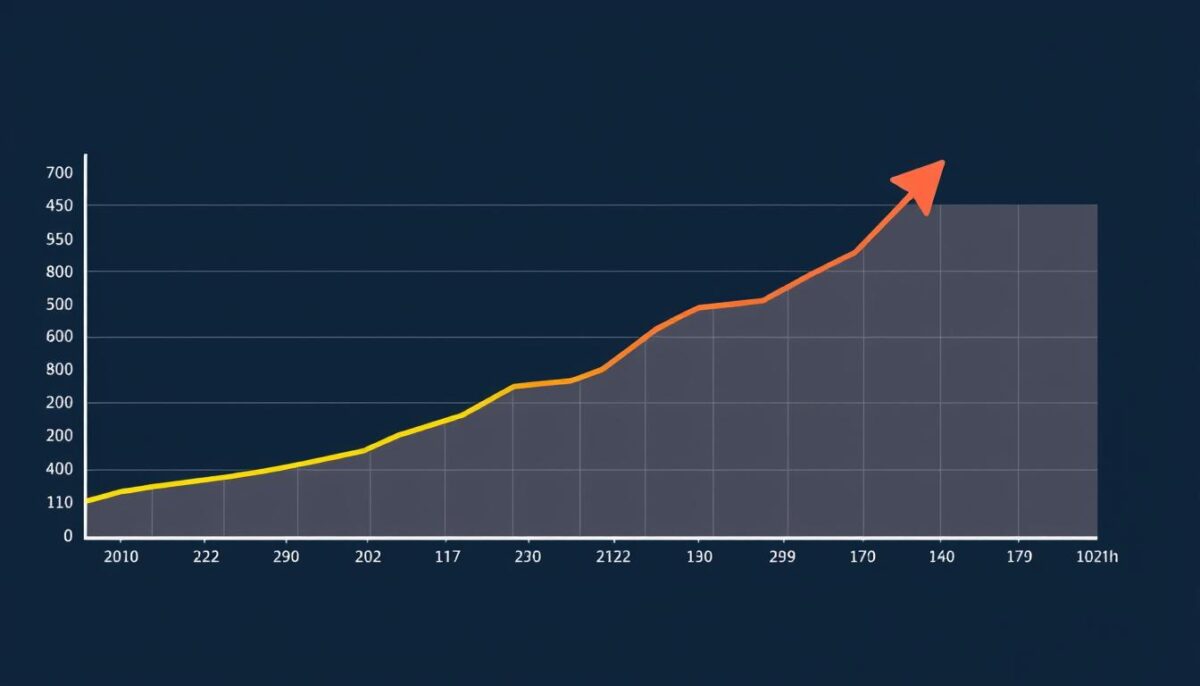
When evaluating wholesale food distributors, one crucial factor often overlooked is their financial stability and the credit terms they offer. A distributor’s financial health can significantly impact their ability to maintain inventory levels, negotiate with suppliers, and offer favorable credit terms to customers.
The Impact of Distributor Financial Health on Your Supply Chain
The financial stability of your wholesale food distributor is crucial for ensuring a consistent supply of products and long-term partnership reliability. Distributors with strong financials can better weather market fluctuations and supply chain disruptions, providing more consistent service to their customers. Conversely, a financially unstable distributor may lead to inventory shortages, quality compromises, and sudden policy changes that can disrupt your business operations.
To assess a distributor’s financial health, you can review credit reports, industry news, and feedback from other customers. This research will help you understand their ability to maintain a stable supply chain and negotiate favorable terms with suppliers.
Comparing Credit Options Among Leading Distributors
Leading distributors like Sysco, US Foods, and Performance Food Group offer varying credit terms that can impact your cash flow. For instance, Sysco is known for its flexible payment options and competitive credit limits, while US Foods offers tailored financing solutions for large businesses. Performance Food Group, on the other hand, provides a range of payment terms that can be adjusted based on your business needs.
Understanding the credit options and financing solutions offered by different distributors can help you manage your cash flow more effectively and support your business growth. It’s essential to compare these options carefully and negotiate the best possible terms based on your business volume and payment history.
Hidden Factor #3: Proprietary Brand Quality and Value
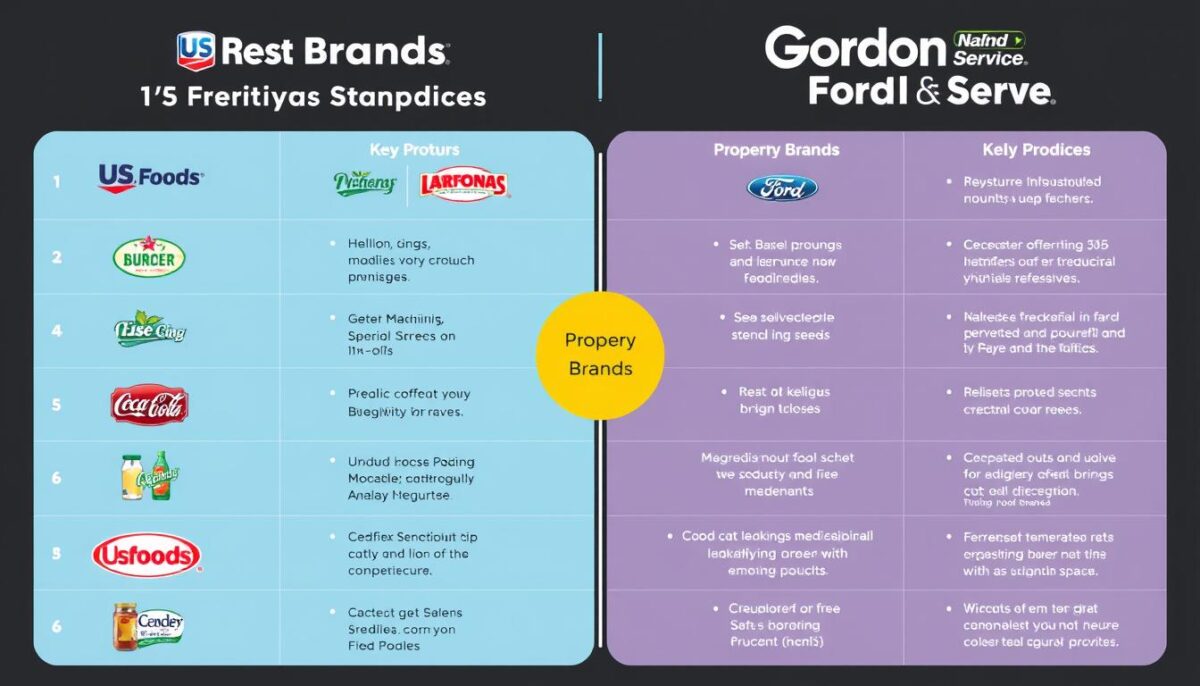
Assessing the proprietary brands of wholesale food distributors is essential for understanding their potential to offer cost savings without compromising on quality. Most major distributors offer house brands that can significantly reduce costs compared to national brands.
Distributors like US Foods and Gordon Food Service have developed their own proprietary brands, but the quality and value they offer can vary.
Evaluating House Brands from US Foods vs. Gordon Food Service
US Foods is known for its high-quality private-label products, while Gordon Food Service (GFS) has over 120 years of experience providing high-quality food products. Evaluating these house brands involves sampling, ingredient analysis, and performance testing in specific applications.
US Foods focuses on consistency and quality control, while GFS emphasizes local sourcing and regional preferences.
Cost Savings Without Sacrificing Quality: What to Look For
To balance cost and quality, businesses should identify categories where house brands offer the best value and those where national brands are worth the premium. Successful businesses have incorporated distributor house brands to improve profit margins without compromising quality.
By understanding how distributors develop and source their proprietary products, businesses can make informed decisions about their inventory.
Hidden Factor #4: Specialized Expertise in Your Specific Industry

A food distributor with deep understanding and expertise in your specific industry can be a game-changer for your business operations. When evaluating potential distributors, it’s essential to assess their ability to cater to your unique needs.
Industry-Specific Knowledge: Why It Matters More Than Size
Having a distributor with industry-specific knowledge can provide more value than a large distributor without such expertise. This specialized understanding translates into better product recommendations, effective problem-solving, and tailored business support. For instance, a distributor with expertise in serving restaurants can offer insights into menu planning, seasonal fluctuations, and regulatory compliance.
Distributors with Dedicated Divisions for Different Food Businesses
Some food distributors have dedicated divisions for different types of foodservice businesses, such as restaurants, healthcare, or education. These specialized divisions allow for more focused solutions, stronger relationships with niche suppliers, and a deeper understanding of the specific challenges faced by businesses in these sectors. When evaluating distributors, look for those with a specialty in your industry for more effective support.
Hidden Factor #5: Technology Integration and Data Analytics
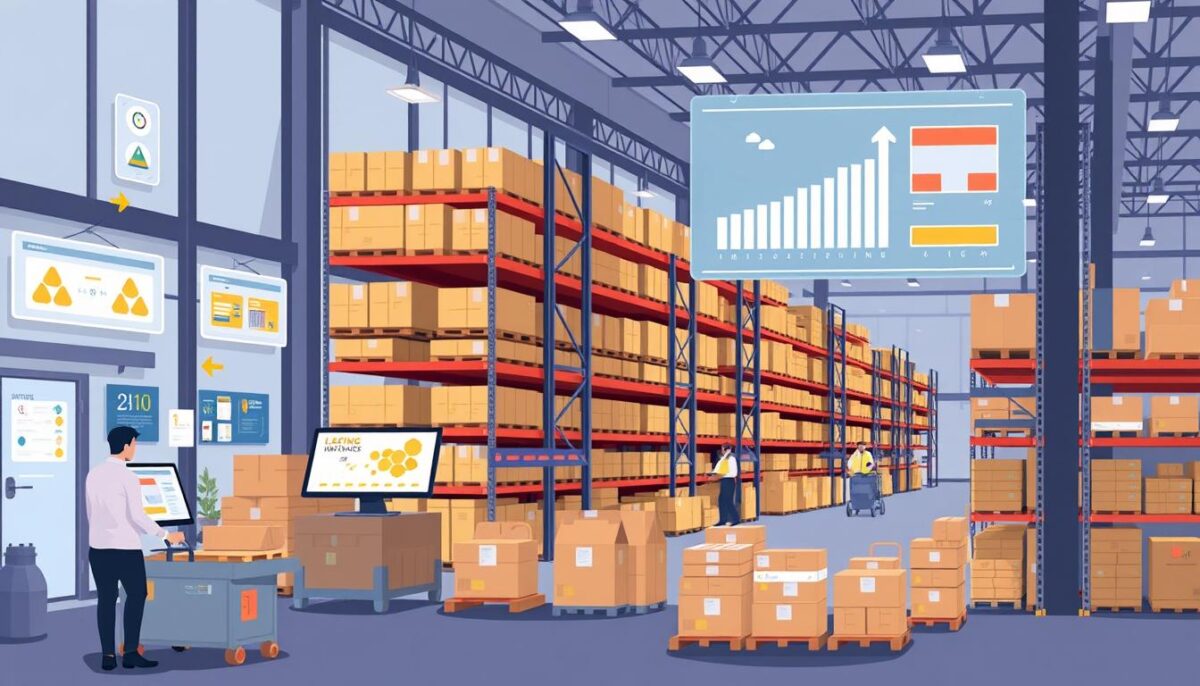
Modern food distributors are increasingly differentiating themselves through their technology offerings. Advanced ordering systems, inventory management tools, and supply chain technology are just a few examples of how distributors are leveraging technology to help businesses streamline their operations.
How Advanced Ordering Systems Save Time and Reduce Errors
Advanced ordering systems offered by food distributors can significantly save time and reduce errors. These systems often include features such as inventory tracking, order history analysis, and automated reordering capabilities. By streamlining the ordering process, businesses can focus more on customer service and less on manual data entry.
Distributors Leading the Way in Supply Chain Technology
Some food distributors are at the forefront of supply chain innovation, offering cutting-edge technology solutions that improve the efficiency and accuracy of food delivery. Companies like Sysco and Performance Food Group are investing heavily in digital transformation, providing their customers with advanced tools for managing their supply chains. By leveraging these technologies, businesses can gain valuable insights into their purchasing habits, optimize their inventory, and reduce waste.
Hidden Factor #6: Disaster Preparedness and Contingency Planning
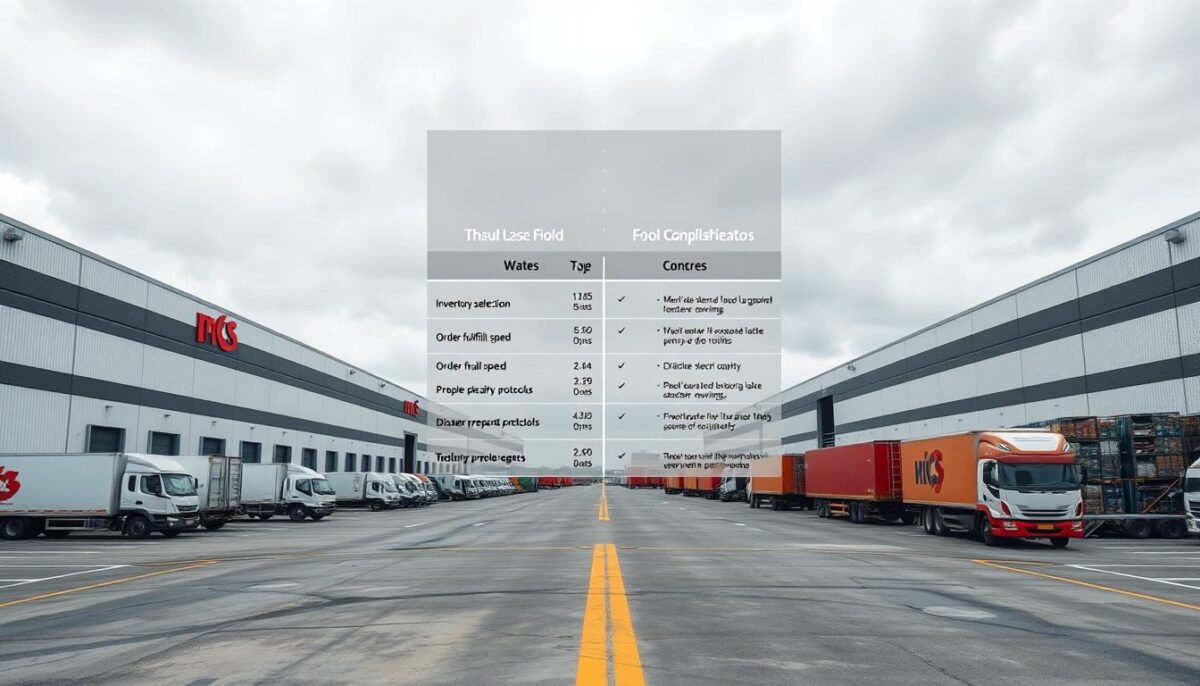
The recent global events have underscored the importance of disaster preparedness in the food distribution industry. When selecting a food distributor, it’s crucial to evaluate their ability to maintain service during disruptions, ensuring a consistent supply of food products to your business.
Learning from Supply Chain Disruptions: Which Distributors Adapted Best
Recent supply chain disruptions have highlighted the critical role of disaster preparedness. Distributors like Sysco and Performance Food Group have demonstrated exceptional adaptability, maintaining customer service even when others couldn’t. Their ability to adapt stems from robust contingency planning, including backup power systems and alternative transportation methods.
Evaluating Backup Systems and Alternative Sourcing Capabilities
When assessing a distributor’s disaster preparedness, it’s essential to examine their backup systems and alternative sourcing capabilities. This includes evaluating their investment in redundant supply chains and geographically diverse sourcing, which can ensure consistent product availability even during challenging times. Businesses should ask potential distributors about their emergency protocols and business continuity plans to gauge their readiness for unforeseen disruptions.
Working with distributors who maintain higher inventory levels of critical food products can serve as a buffer against supply chain interruptions, safeguarding your business operations. By prioritizing disaster preparedness, you can build a more resilient supply chain that supports your business continuity and customer satisfaction.
How to Compare Wholesale Food Distributors Using These Hidden Factors

Comparing wholesale food distributors requires a comprehensive approach that goes beyond just price and product selection. To make an informed decision, you need to evaluate several key factors that impact your business.
Start by using a practical framework that considers the six hidden factors discussed earlier. Create a comprehensive checklist of questions to ask potential distributors about each factor, including their distribution network, financial stability, proprietary brand quality, industry expertise, technology integration, and disaster preparedness.
Develop a weighted scoring system that prioritizes the factors most important to your specific business needs and goals. Consider conducting site visits to verify claims and assess operations firsthand. Additionally, request and check references from similar businesses to gain insights into real-world distributor performance.
By following these steps and regularly reassessing your distributor relationships, you can ensure that your chosen distributor continues to meet your evolving business needs.
Conclusion: Making a Strategic Decision for Long-Term Partnership
Choosing a food distributor is more than just a transactional decision; it’s a strategic partnership that can significantly impact your business’s growth and profitability. As we’ve explored, six hidden factors play a crucial role in distinguishing exceptional distributors: distribution network depth, financial stability, proprietary brand quality, specialized industry expertise, technology integration, and disaster preparedness.
By carefully evaluating these factors, you can select a distributor that not only meets your current needs but also supports your future growth. Building a strong relationship with your distributor representatives and maintaining open communication about your evolving needs is crucial. Regularly assessing their performance against these six factors ensures continued alignment with your business objectives.
The right distributor partnership can provide competitive advantages beyond just product supply, including valuable market insights and trend awareness. As the foodservice landscape continues to evolve, staying informed about changes in distributor capabilities and offerings is essential. By applying these insights, you can make a strategic decision that drives your business forward and achieves long-term success.
FAQ
What are the key factors to consider when selecting a wholesale food distributor for my business?
When choosing a distributor, I consider factors such as distribution network depth, financial stability, proprietary brand quality, specialized expertise, technology integration, and disaster preparedness to ensure a reliable partnership.
How does a distributor’s financial health impact my business?
A distributor’s financial stability directly affects their ability to maintain a consistent supply chain, offer competitive credit terms, and invest in technology and logistics, ultimately influencing my business’s overall success.
What is the significance of proprietary brand quality in a distributor?
High-quality house brands can offer cost savings without compromising on taste or quality, making them an attractive option for my business; I look for distributors with a strong portfolio of private label products.
Why is industry-specific knowledge important in a food distributor?
Distributors with dedicated divisions for specific industries, such as restaurants or retailers, can provide tailored solutions and expert advice, helping me navigate the complexities of my business and make informed decisions.
How can technology integration benefit my business?
Advanced ordering systems and data analytics can streamline my operations, reduce errors, and provide valuable insights, enabling me to make data-driven decisions and optimize my supply chain.
What should I look for in a distributor’s disaster preparedness plan?
I expect a distributor to have a robust contingency plan in place, including backup systems and alternative sourcing capabilities, to minimize disruptions and ensure business continuity in the face of unexpected events.
How can I evaluate the quality of products offered by a distributor?
I assess the quality of a distributor’s products by reviewing their product offerings, sourcing practices, and quality control measures, as well as seeking feedback from other customers and industry experts.



